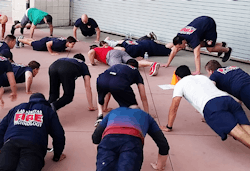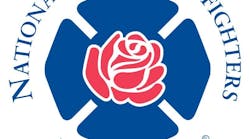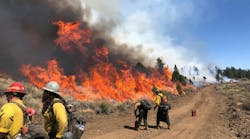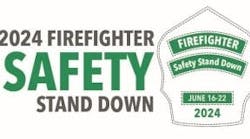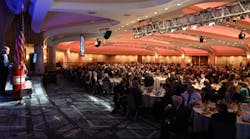We all know that the job itself—whether it’s performed as a volunteer or as a career member—is stressful, and the last thing that members need is a stressful firehouse environment that isn’t conducive to their good health. That’s why, now more than ever, you must build positive and healthful crew and department cultures.
Multiple benefits
Every crew—a group of people who are assigned to a particular shift, firehouse, battalion and/or department—has some type of culture, whether the people know it or not. The culture is a set of attitudes, values, beliefs, goals and other characteristics that create the work environment—in other words, “the way that things work around here.” That environment can be gratifying and/or stressful. It can be beneficial to members’ health or detrimental to it.
This is where E.M.S. is of utmost importance. We all must focus on (E) encouraging movement, (M) minding our nutrition and (S) sleeping for recovery. Creating a culture that’s conducive to the health of members ensures that every component of the crew environment contributes to developing and reinforcing these actions. Promoting a healthful crew culture affords improved performance, better working relationships and conditions, and a happier crew. Furthermore, if we truly believe in the brotherhood and sisterhood of the fire service, we must encourage each other to improve our health and wellness.
Encourage movement
Encouraging movement is more than just working out together as a crew, although that’s part of it.
Our society has become more and more sedentary, and the fire service is no different. So, the more movement that we can incorporate during our day, the more calories that we burn, the more energy that we have and the better that our health is. Find ways to get more movement through the day and encourage your crew to do the same.
Use fitness/activity trackers and smartwatches to encourage individuals to take at least 8,500 steps per day. We love challenges, so put a board on the wall and track your crew’s steps for a month.
One of the best ways to bond with a crew is to sweat together through training and workouts. Dedicate time during each shift for crew members to work on their fitness. Of course, training on shift can be challenging for numerous reasons, including calls, lack of motivation, lack of equipment and different member levels of fitness. You also must “leave some gas in the tank,” so members won’t burn out on a call.
The best crew workouts improve mobility, core strength and fireground performance and can be scaled for all levels. (See “Create a Functional Crew Workout” on the next page for a template for doing all of these things.)
Another great way to improve crew bonding and performance is to physically train. Walk around the response district. Do building surveys. Throw ladders in the back of buildings. Pull a line or two.
Mind the nutrition
You can’t build a healthful shift/firehouse/department culture if you deny or avoid addressing the way that you eat as a crew.
Pastries, sugary fruit juices, energy drinks and processed foods are a big staple in many firehouses. You must understand that the foods that members eat, particularly while on shift, either fuel them for the demands of the day or add stress and more health risk down the road.
Open any firehouse refrigerator and you likely will see a yogurt canister that includes almost 20 grams of added sugar and/or a sugary fruit juice that contains more than that. Research shows that sugar fuels inflammation, cancer, diabetes and heart disease and even can inhibit cognitive function.Reduce the added sugars that are around the firehouse—or any house. Instead of the juices, change the culture and have fruit-infused pitchers of water. Read labels and start talking about all of the sugar that’s added to all of the firehouse staples.
Have fruits and vegetables with every meal. A diet that’s rich in vegetables and fruits can lower blood pressure, reduce the risk of heart disease and lower the risk of cancer. Make sure that there always are fresh fruits and vegetables served with any firehouse meal. (Here is another situation where E.M.S. is appropriate: Healthy crews make sure to Eat More Salads.)
Also, emphasize proper hydration. A properly hydrated firefighter has better stamina and cognitive function and is more prepared to meet the demands of the shift. Try to always have water on your rig and at all meals. During training, promote replenishing with water instead of with sugary sports drinks.
Sleep for recovery
Sleep is the foundation of health. First responders are among the world’s most sleep-deprived professionals because of inconsistent sleep patterns, work/life stresses and exposure to traumatic calls. Because sleep deprivation can lead to and exacerbate addiction and other serious health concerns, sleep should be a priority for every member of the fire service. Although we can’t stop responding to late-night calls, simple actions can promote more effective and healthful sleep.
For firefighters who are on shift, naps can be a great way to help to recharge and maintain alertness. You may even encourage members to take a “coffee nap.” Research shows that consuming a moderate amount of caffeine immediately followed by a short nap can be an effective way to recharge.
Promote healthful sleep hygiene. Of course, discussing the underlying causes of department issues late into the night can be an enjoyable activity. However, it can negatively affect a person’s well-being if it prevents the individual from getting enough sleep. Establishing good sleep habits involves going to bed at a consistent time every night, creating a quiet, dark sleeping environment, and minimizing exposure to cellphones and TVs (specifically blue light) before bedtime.
A positive influence
As a member of a crew, you can play an essential role in either contributing to a healthful culture or breeding one that’s detrimental. Encourage movement, mind your nutrition and sleep for recovery. These are great ways to show your brothers and sisters that we care.
Aaron Zamzow will present “Improving Fireground Performance and Resilience” and “Heathy You = Healthy Crew: How to Create a Fit and Healthy Culture” at Firehouse Expo. To register, visit firehouseexpo.com.
